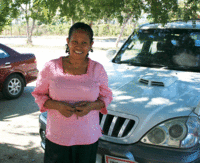Cecily McNeill
15 August 2011
The tiny nation of Timor-Leste, 500 kilometres north of Australia, is preparing to elect a new government next June, 12 years after its people voted overwhelmingly for independence from brutally repressive Indonesian rule.
The independence vote on August 30, 1999, set off another round of massacres, rape and torture as Indonesia withdrew after 24 years of terrorism during which a third of East Timor’s population died violently. In the process of rescinding control, Indonesian troops and militia destroyed two-thirds of the country’s infrastructure.
 One person hoping for a peaceful parliamentary election is the secretary-general of Red Cross in Timor-Leste, Isabel Amaral Guterres, who was a commissioner on the Reception, Truth and Reconciliation Commission, 2000 to 2004.
One person hoping for a peaceful parliamentary election is the secretary-general of Red Cross in Timor-Leste, Isabel Amaral Guterres, who was a commissioner on the Reception, Truth and Reconciliation Commission, 2000 to 2004.
The seven elected members of the commission spent four years listening to the stories of rape, torture and intimidation of the East Timorese now documented in a 2,000-page report.
Isabel visited all districts of Timor-Leste, Bosnia-Sarajevo, Croatia, Mexico, Italy, Fiji, Indonesian West Timor and Australia to find ways to ensure a practical, Christian response to the people’s sense of past injustices and sufferings. Her focus has been on rehabilitation and moving forward rather than on a punitive approach.
But Isabel fears a legacy of violence in the people who grew up during the quarter-century of Indonesian rule will be hard for the tiny nation to overcome.
Many of today’s young Timorese are strongly influenced by the culture of violence brought when Indonesia invaded East Timor in 1975. Further incidents of unrest have occurred in 2002, 2006 and in 2008 when attempts were made on the lives of the president, Xanana Gusmao and prime minister Jose Ramos Horta.
As she said when introducing Chega! to the Australian Parliament in 2006, ‘[the recommendations] are not quick fixes but long-term measures based on lessons learned, not from the latest how-to manual on good governance, but from Timor-Leste’s own school of hard knocks. They warn about the dangers posed by the proliferation of security agencies and violence, impunity, marginalised urban young men and ineffective institutions; they spell out ideas to ensure the neutrality of the police and military, security of person, and ways to embed a culture of accountability, non-violence, human rights and rule of law. The relevance of these issues will be immediately apparent to anyone who has followed our fortunes this year.’
Isabel says it is important to promote the message of tolerance and respect after the trauma that the nation has been through.
‘We must be careful about the message we give to our young people. Rather than attacking each other and calling each other names, we must try to live in harmony.’
With unemployment at some 40 percent of the workforce, there is much to do to bring about equality throughout the nation. Isabel says this is a challenge that must be faced. But people cannot just wait for the government to do something about job creation. They must find ways to create work for themselves, she says.